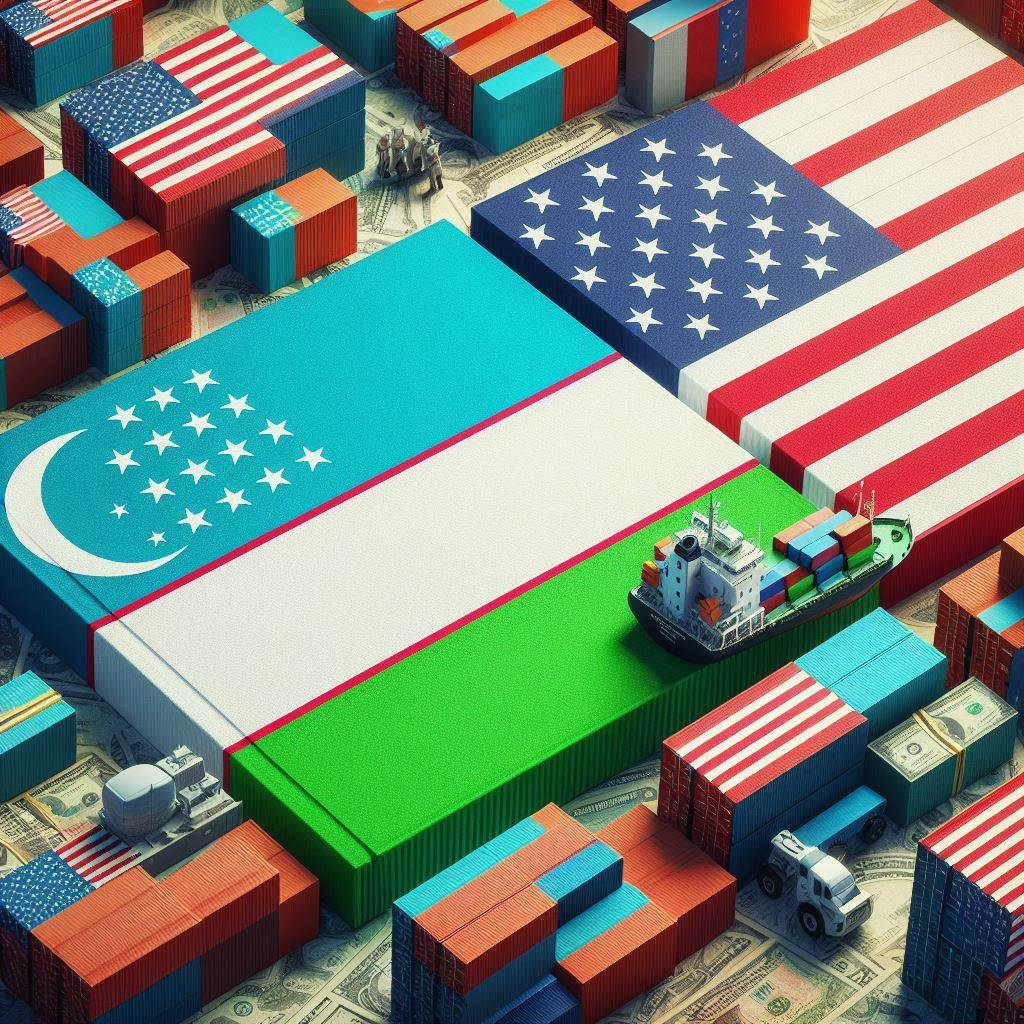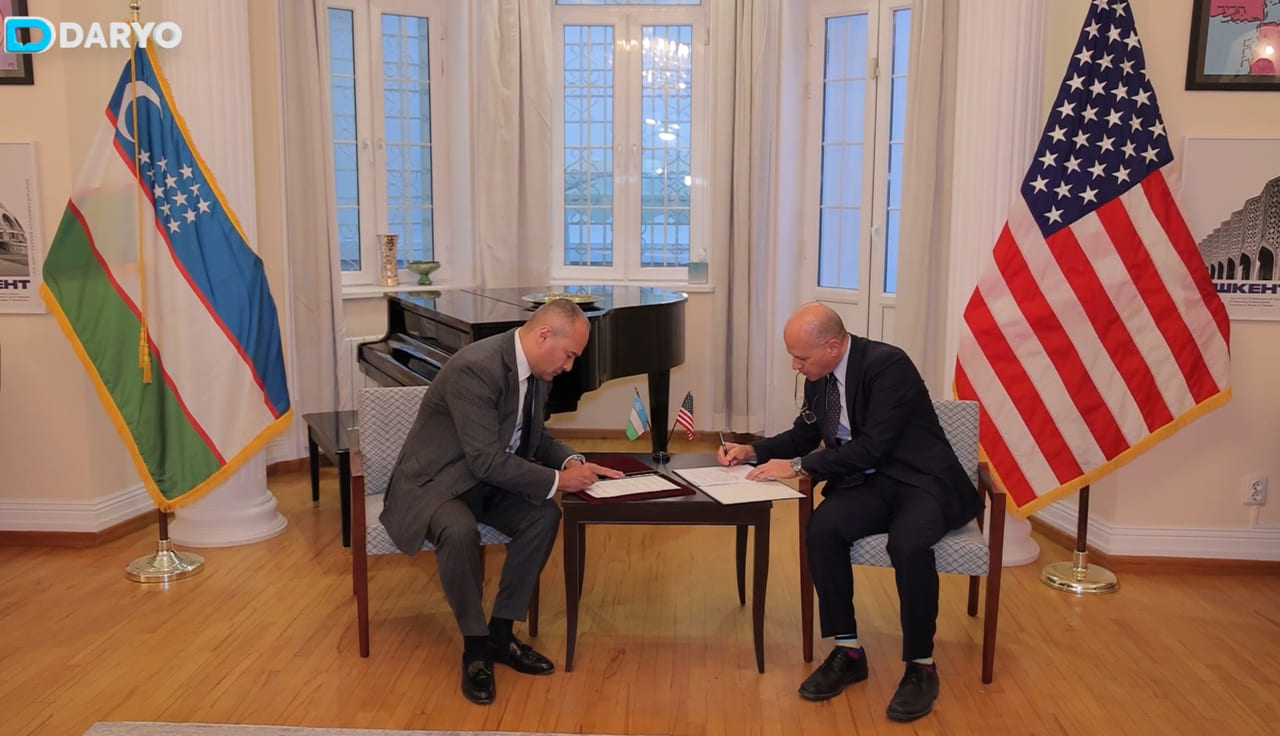As of August 2024, trade relations between Uzbekistan and the United States have witnessed an upswing, reflecting the strengthening economic ties between the two nations. The total trade turnover reached $613.6mn, marking a 64.6% increase from $372.3mn in the same period of 2023 and a 100.9% jump from $305.7mn in 2022. This growth can be attributed to enhanced cooperation, strategic initiatives, and an evolving economic landscape that fosters increased trade activity.
Exports from Uzbekistan to the USA have surged from $38.4mn in 2022 to $90.1mn in 2023, and further skyrocketing to $210.0mn in 2024. This increase represents a substantial growth of 132% compared to 2023 and 447% from 2022. Such a surge can be attributed to Uzbekistan's efforts to diversify its export base and improve product quality, especially in sectors like agriculture and textiles.
On the other hand, imports from the USA also saw a significant rise, increasing from $267.3mn in 2022 to $282.2mn in 2023, and further to $403.5mn in 2024. This growth in imports represents a 42.9% increase compared to 2023 and 50.9% compared to 2022. The rising demand for American machinery, technology, and consumer goods indicates Uzbekistan's ongoing industrialization and modernization efforts, showcasing a shift towards more advanced manufacturing and technological capabilities.
In June 2024, the trade balance remained positive for the United States, which exported $17.2mn and imported $3.05mn from Uzbekistan, resulting in a favorable trade balance of $14.1mn. However, this marked a decline in exports from $20.9mn in June 2023 and a decrease in imports from $7.73mn, reflecting a 17.9% and 60.6% drop, respectively.

The top exports from the U.S. to Uzbekistan in June 2024 included steam boilers ($14.9mn), cars ($8.79mn), industrial food preparation machinery ($7.43mn), aircraft parts ($1.07mn), and valves ($746,000). Conversely, the top imports from Uzbekistan to the U.S. consisted of dried vegetables ($263,000), pepper ($212,000), radioactive chemicals ($198,000), knit T-shirts ($80,400), and unspecified commodities ($69,500).
The decrease in U.S. exports to Uzbekistan in June 2024 was primarily due to significant drops in key categories such as aircraft parts and motor vehicles, which decreased by 79.4% and 74.4%, respectively. Additionally, the decrease in U.S. imports from Uzbekistan was mainly attributed to reduced shipments of hand-woven rugs and grapes, showcasing a need for better market access and promotional efforts to boost trade volumes.
Beyond trade figures, the burgeoning tourism sector has also contributed positively to economic relations. In the first five months of 2024, Uzbekistan welcomed 10,600 American tourists, primarily for leisure, as they explored historical sites such as Samarkand, Bukhara, and Khiva. Business and familial visits have also contributed to the influx, highlighting Uzbekistan’s growing role as a business hub and a travel destination.

Recently, the U.S. and Uzbekistan have strengthened cooperation in the critical minerals sector, reflecting a mutual interest in sustainable resource management. The signing of a Memorandum of Understanding (MoU) on September 16 emphasizes both countries' commitment to enhancing private sector investment in Uzbekistan’s mining industry while upholding environmental and governance standards.
This partnership aligns with broader initiatives discussed during the C5+1 Presidential Summit, where President Biden and Central Asian leaders highlighted the importance of advancing the clean energy transition while safeguarding regional ecosystems.
The diplomatic engagements between U.S. and Uzbek officials signal a deepening partnership, marked by the recent Cooperation and Mutual Assistance Agreement focused on customs and anti-trafficking efforts. This agreement aims to improve customs operations and combat money laundering, further solidifying the bilateral relationship.
US to import Uzbek melons following export issue resolution
— Daryo | Central Asia & Afghanistan (@DaryoEng) September 16, 2024
Melon shipments are set to begin once all legal procedures are completed. In addition to melons, Uzbekistan is also exploring the potential for exporting grapes, cherries, and legumes to the U.S. market shortly.… pic.twitter.com/2qJ65ojt59
Moreover, the U.S. is preparing to commence the import of Uzbek melons, with shipments set to begin once all technical issues related to their export are resolved. Uzbekistan is also exploring potential exports of grapes, cherries, and legumes to the U.S. market in the near future.
In addition, U.S. businesses are increasingly exploring opportunities in Uzbekistan's expanding market. A spokesperson from the U.S. Department of State confirmed that American companies are actively pursuing entry into the country’s market, particularly in agriculture, livestock, technology, and industrial equipment sectors. Streamlined procedures for product certification could significantly enhance trade flows.
Furthermore, U.S. firms are engaging in public procurement processes within Uzbekistan, bidding on contracts and collaborating with local partners to introduce advanced technologies and manufactured goods into the market.
The U.S. remains committed to supporting Uzbekistan's economic reforms, which have contributed to an improved investment climate, attracting further investment and technical expertise. Initiatives to promote regional connectivity across Central Asia and the South Caucasus are also vital for bolstering economic resilience. The U.S. Agency for International Development (USAID) is involved in promoting trade, entrepreneurship, e-commerce, and private sector competitiveness across the region through its Trade Central Asia program.
Follow Daryo's official Instagram and Twitter pages to keep current on world news.
Comments (0)